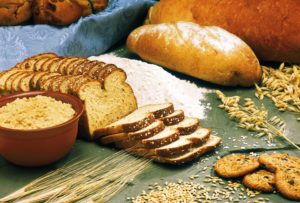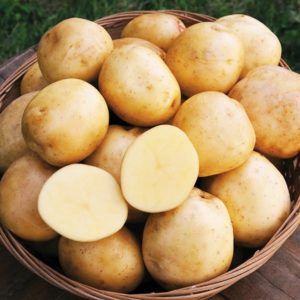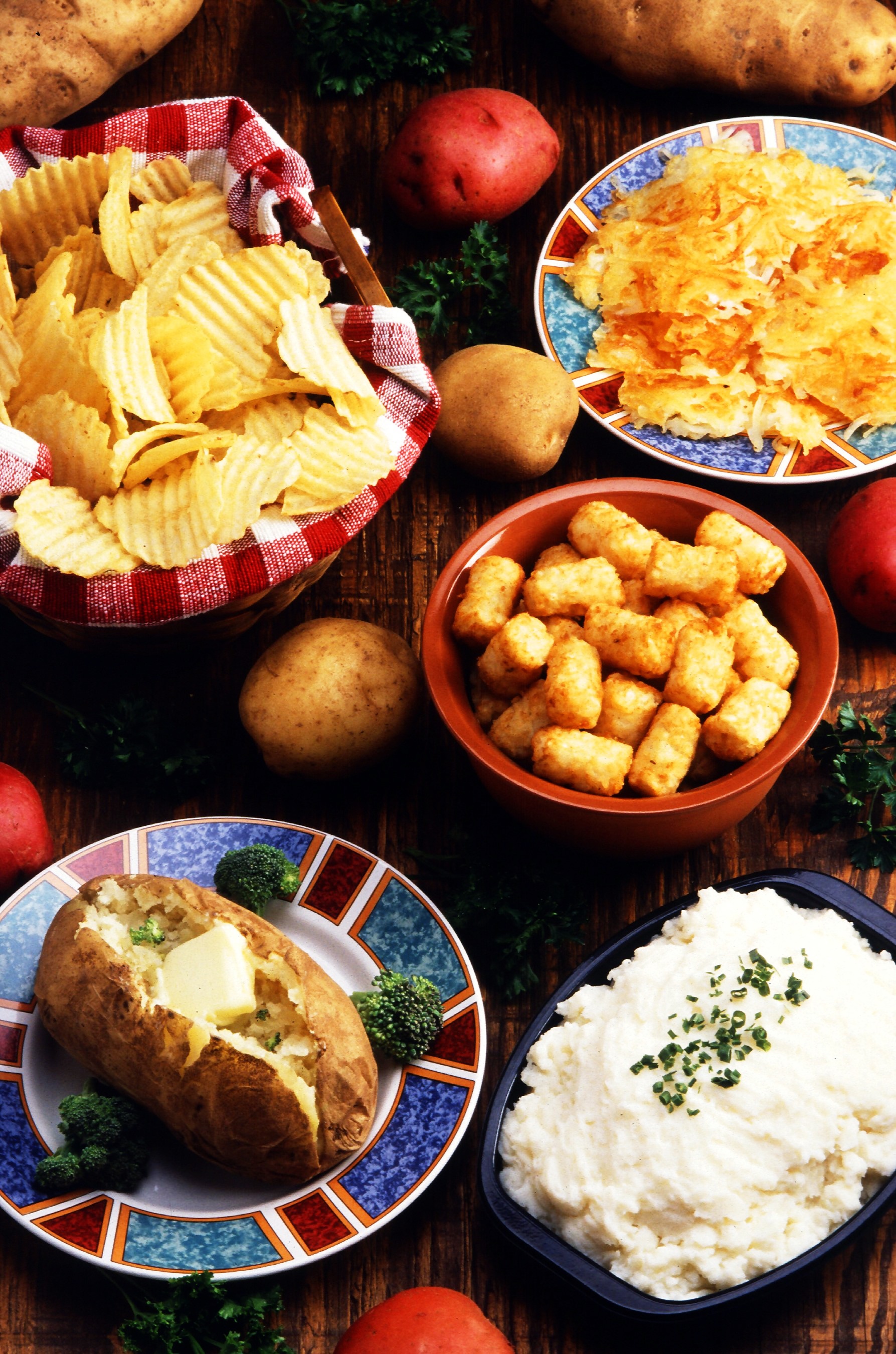[vc_row][vc_column][vc_column_text]Bread, pasta, and candy are all known to be off limits for people with celiac disease or gluten intolerance. Sounds like foods which contain a high amount of carbohydrates must also contain gluten so, by theory, potatoes must also contain gluten. Wrong! In the purest form of a plain potato, they do not contain any gluten.
What is gluten?


Okay. So what types of foods contain gluten?
The short answer is many everyday common foods contains gluten. Wheat is the most notorious form of gluten. However, wheat is found in more foods than just bread. Wheat may be found in a variety of foods such as soups, pasta/spaghetti, cereals, certain sauces and condiments, as well as salad dressings.
Barley is another common ingredient containing gluten. Foods which often contain barley include food coloring, soups, beer (almost every known type of beer), and anything with malt in it. Rye, another ingredient, contains gluten and is found in foods such as breads, beer, and cereals.
Related Article: 5 Berberine Benefits & 5 Best Berberine Supplements to Try
In addition to the primary three types which always will include gluten, there are also many other foods which will often, but not always, contain gluten. If you have gluten intolerance you should be cautious when eating any of the following foods:
- Cold cuts of deli meat
- Anything dusted with flour or breading (including French fries)
- Processed cheeses
- Mayonnaise and miracle whip
- Ketchup
- Asian sauces such as soy sauce and teriyaki
- Imitation or faux meats trying to replace crab
- Egg substitutes
- Sausage (it is highly processed)
- Almost all forms of gravy (almost always made with flour)
- Baked beans
- Chocolate milk
- Hot dogs
- Ice cream
- Numerous types of alcohol such as beer, wine, and vodka
It is estimated that approximately 1% of the country’s population actually has Celiac disease, which is the most severe form of gluten intolerance. Persons with Celiac disease must adhere to a strict gluten-free diet or they will experience extensive digestive system damage overtime.
Unfortunately, it’s also estimated that 10% of the country’s population may have a milder gluten sensitivity that could still cause problems but not to the severe effect as someone with Celiac disease.
Symptoms of Gluten Sensitivity


- Bloating- this is the feeling someone has as if their stomach is swollen immediately after eating. Bloating is one of the most common symptoms people with gluten intolerance exhibit.
- Diarrhea and constipation- everyone has stomach issues at some point which is completely normal. However, if a person becomes constipated or has diarrhea on a regular basis then this may indicate another issue, such as gluten intolerance. Persons who have gluten intolerance and consume foods containing gluten damage the stomach lining leading to poor nutrient absorption leading to said issues. It’s estimated that half of persons with gluten intolerance suffer from regular diarrhea and a quarter suffer from constipation.
- Abdominal pain- this is the most common symptom all persons with gluten intolerance share in common with each other. It’s estimated that more than three-quarters of persons with gluten intolerance experience abdominal pain after consuming gluten. However, there are many potential reasons and causes regarding abdominal pain, some which may be extremely serious. You should seek immediate medical attention if the pain is severe or does not go away in a relatively short amount of time.
- Headaches- again, another condition which many people have but persons with gluten intolerance tend to have them more frequent due to consuming gluten.
- Lethargic or tiredness- this is different than just feeling tired from lack of sleep, stress, or being overworked. Persons who constantly feel tired without any explanation or cause, such as those variables just mentioned, may have a gluten intolerance. Fatigue and tiredness often occur immediately after consuming gluten leaving the person with the condition unable to perform at their peak standard.
- Issues with skin- persons with actual Celiac disease may experience a skin condition called dermatitis herpetiformis that produce blisters. Other skin diseases may also be present with someone who has gluten intolerance and flare up after consuming such foods. Those skin diseases include Psoriasis, Alopecia areata, and chronic urticaria.
- Depression and other mental health issues- in general, persons who have any form of digestive issues have a higher probability of having both anxiety and depression. An increase in mental health issues may be attributed to difference reasons pertaining to gluten sensitivity. Gluten exorphins are peptides formed during digestion of gluten proteins and may interfere with the central nervous system. Also, an increase in the gut microbiota, such as harmful bacteria and decreased good bacteria, may also impact the central nervous system. A number of studies have found that depressed persons without gluten sensitivities will also abide by a gluten-free diet noting they actually feel better and happier.
Are potatoes safe to eat for people who are sensitive to gluten?


What’s the catch? The catch is that not too many people actually eat their potatoes plain. Instead, they are prepared in a way which will not adhere to gluten free guidelines. The information below provides guidance on how to still enjoy potatoes if you are intolerant of gluten.
- Baked potatoes- potatoes which have been baked are completely safe for someone to eat who is sensitive to gluten. The downside is that most people eat potatoes which have been prepared in a kitchen which is not gluten free. Therefore, it may contain add-ons, which may enhance the flavor, but contain gluten. The best way to eat baked potatoes is to make sure that you wrap them in foil as the racks in the oven may have been contaminated with gluten from cakes, pizzas, or other foods. When you are out to eat at a restaurant ask your server if the baked potato may be prepared in a gluten free manner. With the rise in awareness of gluten sensitivities, more and more restaurants are catering to the needs of their patrons. Some restaurants coat the skins of the potatoes with flour and butter or place them on the same racks as other foods. Similar to the practice of preparing baked potatoes at home, the restaurant staff will likely just wrap them in foil, and they’ll be perfectly fine for those with gluten sensitivities.
- French fries- if you make them fresh and from scratch at your house then you can control how they are prepared. You can make them completely naked, meaning free of any flavoring or dustings, and use coating and other spices which are gluten free. Additionally, more companies nowadays have pre-made fries which are prepared in a gluten free manner. The tricky part to adhering to gluten free guidelines while eating French fries is when you go out to eat at a restaurant. As mentioned early, the problem with gluten lies not with the fries themselves; rather, it is the oil which they are cooked in at restaurants. For cost and time saving measures, most restaurants use the same oil to deep fry many different types of foods. Often, the same oil is used to cook fries, chicken tenders, onion rings, and other types of sides and appetizers. In addition to the oil, some restaurants batter their fries to make them crispier and add a distinct flavor. There’s a very good chance that the batter they use contains gluten.
- Mashed potatoes- in general, mashed potatoes should be safe for persons to eat when they prepare them at home as long as they avoid any potential cross-contamination from preparing other foods. The classic and base ingredients for mashed potatoes include potatoes, milk, and butter. These three ingredients alone will pose no problem to someone who is sensitive to gluten. If you don’t have time or actually want to make your own “made-from-scratch” mashed potatoes, there are a few instant mashed potatoes which are gluten-free. Make sure you do your research online prior to getting to the store to make sure that the brand is actually gluten free. In the gluten free community, it’s commonly understood that most mashed potatoes ordered at restaurants contain no gluten but you should always ask your server to be on the safe side.
- Potato skins- these are popular appetizers found in sports bars everywhere. The problem with these is that they are almost always prepared in the same oil fryers as other foods that typically contain gluten. Therefore, contaminating the potato skins you’re about to eat. It’s advised to proceed with extreme caution if you plan to order potato skins due to the high risk of cross-contamination from other foods.
- Potatoes au gratin- this is a red flag and a person sensitive to gluten should stay away from at all times unless they are absolute certain they know each ingredient which was used to make the end product. The problem with potatoes au gratin is that the recipe typically calls for flour to thicken the product as well as bread crumbs for a topping. Both of these ingredients will cause a person with gluten sensitivities to have a flare-up. The same goes for other types of potato casseroles or dishes when there appears to be bread crumbs or other crunchy toppings.
- Other types of potatoes – there are numerous types of potatoes, not just the simple white potatoes that everyone is most familiar with. There are sweet potatoes, yellow potatoes, and more. For those with gluten sensitivity, the good news is that all forms of potatoes are gluten free. Just because it is a red potato does not mean that it has gluten compared to the white potato. The issue with other types of potatoes, like the regular white potato, is that it all depends on how the potato was prepared and whether or not the food has come into contact with any other forms of gluten during preparation.
Related Article: 5 Best Natural Supplements for Diabetes
Are potato chips gluten free?


Unfortunately, most multigrain chips care not gluten free and need to be avoided. People tend to prefer the multigrain chips as they contain a higher amount of fiber and are better for dipping into sauces compared to regular potato chips. While there aren’t as many gluten free options for multigrain chips compared to regular potato chips there are a limited amount of options available.
Tips for safer preparation and consumption of potatoes to remain gluten free
As mentioned periodically throughout this article, potatoes are naturally gluten free but it’s when potatoes are cross-contaminated with other foods during preparation which may have an adverse impact on the consumer. Here are some tips which may help in the reduction of cross-contaminating not only your potatoes but other foods as well to enjoy a gluten free lifestyle.
- Regardless of whether the food which was prepared contained gluten or not, the surfaces should be wiped clean with anti-bacterial wipes or another similar cleaning product.
- A common practice is to wash your hands before handling any food to reduce the potential of spreading germs. This is even more important for persons handling and preparing food for those, or themselves, if they are sensitive to gluten. For instance, if a person handles a loaf of bread then immediately switches to prepare a gluten free dish without washing their hands there is a high probability that cross-contamination will occur transferring gluten particles from the loaf of bread over to the gluten free dish.
- If you live in a household, or own a restaurant, it’s a best practice to use separate pots, pans, and other cookware for gluten containing versus gluten free foods. It’s likely that after being properly cleaned the food will not be contaminated but, as a best practice, it’s strongly recommended to keep these separate.
Common potato toppings which need to be considered in the gluten free community
- Cheese- the majority of cheeses do not contain any gluten and you may put cheese on your potato without worry of contaminating it with gluten. Blue cheese, cheddar, provolone, swiss, cottage, American, etc., all usually contain no gluten. However, make sure that you read the labels because there are so many different brands and companies with their own special ingredients. Be cautious of shredded cheese products as there may be starch added to prevent the shreds of cheese from sticking together.
- Butter- butter is perfectly fine to eat. It contains no gluten and can be enjoyed on your baked potatoes.
- Sour cream- like butter, sour cream is also perfectly safe to top your baked potato or other types of potatoes.
Related Article: 5 Best Supplements To Lower Blood Sugar
Question to ask the server or chef at a restaurant if your concerned about consuming gluten:
- Has this food been marinated in anything? If so, what? May I see the cans and/or nutritional information?
- Are there croutons on the salad? If so, can they please be left off? Even if the chief puts the croutons on by mistake and then removes them, the food is still contaminated and you may still have a reaction.
- Will any of this food be dusted with flour prior to being cooked? Sometimes a light dusting of flour is not detectable after being cooked but the impacts of the gluten will still be felt by those which are intolerant of gluten.
- This dish says crabmeat (or seafood). Is this the “real deal” or is it imitation? Imitation foods often contain sources of gluten.
The important thing to remember is that you or your loved one’s health is on the line so do not feel like you are bothering the restaurant or being a nuisance when inquiring about gluten. People are not embarrassed about peanut allergies, and neither should you regarding gluten allergies. As mentioned earlier in this article, more people and businesses are becoming aware and educated about gluten and its effects on persons and are accustomed to being asked.[/vc_column_text][/vc_column][/vc_row]
